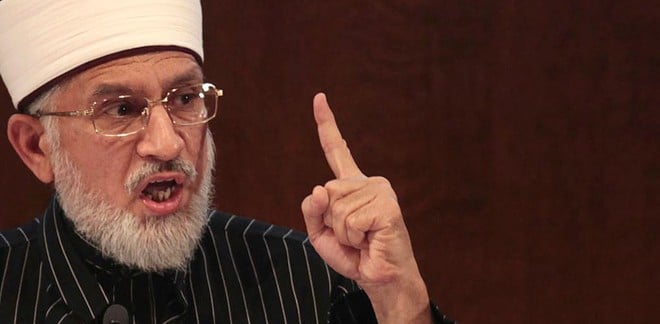

It was March, 1977. The then opposition, Pakistan National Alliance (PNA), was holding protest rallies around the country against alleged rigging in the elections. The movement was not picking up steam as expected by the opposition when, on April 9, the law enforcement agencies opened fire, killing at least a dozen people. The incident added fuel to the protests and, within three months, it was all over for Pakistan’s most popular leader Zulfikar Ali Bhutto.
It is still a mystery as to who actually ordered the firing and why.
Almost 40 years later, with politics in the country still unsettled and democracy still taking roots, Imran Khan a major opposition leader is on the streets protesting against rigging in last year’s election. The ugly incident in Lahore, just a week before Dr Tahirul Qadri’s arrival in Pakistan, that killed 8 people and injured about a 100 could strengthen the anti-government protests and bring rival opposition parties on one platform.
Irrespective of whether Dr Tahirul Qadri’s early morning speech instigated a fresh round of violence, whoever ordered such brute action was certainly not a friend of democracy.
If the PML-N leadership really wants that all attention should stay focused on the military operation launched in North Waziristan for which it requires a national consensus, it should make sure it does not repeat the performance of June 16.
Is this going to be a revival of an alliance like the Islami Jamhoori Ittehad (IJI) of 1988? Is the stage being set to create unrest in the country and then call the army to take over? One only wonders who the ‘author’ of this new IJI-like Grand Opposition Alliance (GOC) is.
In the coming weeks and months, especially in Ramzan, we may see a lot of political activities, maybe not on the streets but in the drawing rooms of politicians. Ch. Shujaat Hussain, chief of PML-Q, is already on a mission to launch the grand alliance.
The timing of the Lahore incident is important. The pro-operation camp of politicians now stands divided, though both sides of political divide still support the army offensive against the militants. This situation has created space for religious parties who, with the exception of Jamaat-e-Islami (JI), have also extended support to the army. JI has not supported the operation but is not very vocal in its opposition either. Its recent statement, asking all militant groups to lay down arms, is significant.
While all political parties condemned the Lahore attack, it was MQM chief Altaf Hussain who went out of the way in his condemnation. The MQM was the only party that even observed a Mourning Day, though it withdrew its ‘shut down’ call on the request of business community.
Imran Khan, Altaf Hussain and Dr Qadri, all three have street power. If the three join hands it could pose a real threat to the government. Except for Imran Khan, the other two have already hinted that they would not oppose any ‘anti-democratic’ move. In a recent interview when Altaf Hussain was asked if he would support any undemocratic move in the prevailing situation, he said he would "if it is in public interest and brings peace to the country."
As for Dr Qadri, he is already asking the army to take over and get rid of what he termed as a ‘corrupt’ system.
Imran Khan, on the other hand, is keeping his distance from such demands because of his past experience with retired General Pervez Musharraf and the criticism he faced for trying to derail democracy.
The Lahore incident was also a warning to Dr Qadri that the government means business and that he will not be getting the kind of treatment that he received at the hands of the PPP government, when he led the ‘Long March’ from Lahore to D-Chowk. There will no ‘AC-fitted container’ available for him. Police have already registered an FIR in which thousands of his unknown supporters have been nominated. This FIR can be used for a crackdown on Qadri supporters in case they plan any anti-government agitation.
Qadri may also not be facing cool customers like former Interior Minister, Rehman Malik, Khursheed Shah or Qamar Zaman Kaira to defuse his movement. This time he will have to deal with tough leaguers like Ch. Nisar Ali Khan, Khwaja Asif, Khwaja Saad Rafiq and Abid Sher Ali or Pervez Rasheed.
A dual national, Qadri has announced to come to Pakistan to fulfill his unfinished agenda -- to bring about a revolution of some kind. Will his movement take off after his scheduled landing on June 23 at Benazir International Airport, Rawalpindi? His arrival in the backdrop of bloody clashes in Lahore on June 16 will certainly draw huge media attention.
He succeeded in getting a substantial crowd at D-Chowk in the chilly winter during the PPP government. He is now coming when temperature in the major cities of Punjab is above 40 degree celsius. There will be no free hand for his supporters and workers and they may not be allowed to enter the Benazir International Airport which is already handed over to the army after the Karachi airport incident.
Qadri’s unfinished agenda includes dissolution of the Election Commission of Pakistan, formation of caretaker government of national consensus with the approval of army and judiciary, accountability and qualification of only those candidates who fulfill the requirement of Articles 62 and 63.
"If Chairman Mao’s Long March could take weeks and months, this march would also not end unless our charter of demand is accepted and implemented," Allama Qadri declared the last time he was here. What he forgot perhaps was how Mao led his March, went shoulder to shoulder with his supporters who were revolutionaries and not preachers.